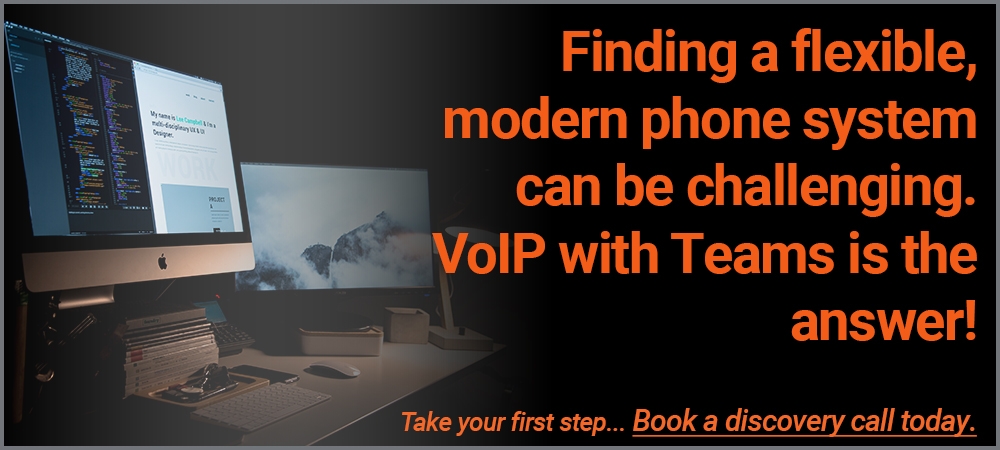As we have already explored in the previous article, due to technological advancements and the arrival of the devastating Covid-19 pandemic, the world of work has changed by unrecognisable amounts in comparison to just a few years ago.
Covid-19 forced many businesses to make a change to their work processes that they simply weren’t prepared for – they adopted a remote working strategy practically overnight. Business owners – in an attempt to keep their organisations from going under – were forced into the change, and admirably approached it with not just an open mind but a level of spirit to beat the virus and move forward. It was unfortunate, however, that the way they chose to operate from home was only capable of serving purpose temporarily.
Now that we seem to have seen and coped with the worst of the pandemic, business owners need to look to the future and find a long-term flexible solution to their remote working. We now know that VoIP and Microsoft Teams are the best solutions to the majority of issues that business owners are having when remote working. With Teams offering levels of collaboration, communication, and productivity that rivals any app of its kind on the market today – combined with the quality of VoIP – your remote working team can even rival your on-premise one.
In the remainder of this article, we will take a closer look at VoIP and VoIP in Teams. In the process we hope to enlighten you to the possibilities that a combination of the two can offer you and your team.
VoIP – what is it?
VoIP stands for Voice over Internet Protocol. VoIP is a phone service delivered over the internet – it allows you to make a call directly with a computer or a VoIP phone.
Why VoIP?
We’re sure you will agree that starting and running your own business is all about profit. Of course, there are other elements that are important – morale and happiness, for example – but as bad as it sounds the reason that these other elements are important is so that the bottom line is as attractive as possible. ISDN is approaching the very end of life – it hasn’t got long left at all. This – combined with the fact that traditional phone systems are often extortionately expensive – places VoIP firmly in pole position as the logical decision when it comes to choosing the right method of connectivity for your team. VoIP makes them reachable from anywhere on the globe, and it is this fact that renders it so appealing to business owners.
Let’s list some of the many reasons why VoIP has become the number one choice for business owners all over the world.
As you know, traditional phone systems assign a specific number to a line that runs to a business. This makes any change to remote working not only a tedious task but a nerve racking one too – you are trusting your employees to remember and input the right codes into their mobile in order for it to show up as the reputable office number. A lot of time is wasted doing this and waiting for calls to be transferred – all time that could be better used.
VoIP allows you to make your service completely mobile. Your team can work from home for a few days a week, for example, and then spend the rest of the work week in the office; their days can change as you wish according to the needs of the business. VoIP makes adapting between a remote work setting to the on-premise one (and vice versa) seamless – so smooth, in fact, you can pull the wool over your clients’ eyes (they are under the impression your team are still at their desks when in reality they could be anywhere on the globe with an internet connection).
- Seamless mirroring of the office setting
As we said, your clients should be oblivious to the fact that you aren’t at your desk. VoIP allows you to mirror the professionalism that your team achieves on-premise – customer processes stay exactly the same, they call the same reputable company number and are greeted with the familiar company slogan or greeting. Details like this make a massive difference to the quality of service you are offering your client base – and, more importantly, your potential customer base. Being able to remain professional at all times allows you to not only provide a good service but also establish a repeat customer base.
Voicemail was once one of the most important parts of business operations, but, in the fast paced world we live in, it has gradually become surplus to requirements. Voicemail can’t simply be eliminated for every business out there, but, with VoIP, you no longer need it. As we said, VoIP allows you to choose where your calls ring, and how. You could have the first calls to the place you spend most of your time – undoubtedly as a business owner that would be your office – but again, as a busy business owner you are always on the go, so the second could take place to your mobile device, and then another to your house, and this can continue as many times as you wish. This technology offers you confidence that was previously not achievable, and you can announce to customers that you will never miss their calls without just making a wild claim.
VoIP delivers feature versality that old traditional phone systems couldn’t dream of offering. VoIP’s array of small features – when all connected and working together – can revolutionise your workday. For example, let’s briefly explore ‘Voicemail-to-text.’ The feature takes a transcript of your Voicemails and sends them directly to your Email inbox – this offers a unique option; you can deliberately miss a client’s call for whatever reason and continue with your workday with the peace of mind that you can refer to the transcript at a later date when the time suits you. Explore the features in VoIP; there are many – and, as small as some are, when the right combination is found they can revolutionise the way you do business.
Yes, there is a key issue that comes with VoIP – if you lose internet connection you lose the ability to make calls. Of course, no business in the world can be so precariously placed on the edge of potentially not being able to operate by something so fickle as your Wi-Fi connection. When used correctly VoIP should irradicate this risk – as we said earlier in the article, if implemented correctly VoIP is more than flexible, you can choose where your calls are forwarded to (meaning that if you were to lose your Wi-Fi connection then you simply direct your calls to a different location and continue as normal).
VoIP with Teams – The Best Choice
Most of us know what Microsoft Teams is, but, for the few that don’t, Microsoft Teams is one of the most popular business applications on the market. It is one of the latest and greatest additions to the Microsoft suite of tools and has amassed an astonishing 250 million daily active users globally. Microsoft Teams allows businesses to streamline daily work tasks and offers your team the ability to connect with each other from anywhere on the globe with an internet connection. Teams is designed with the sole intention of improving the levels of communication, collaboration, and productivity that your team can achieve, regardless of their location – whether they are at their desk, on holiday with the family, or on their boat sailing the Mediterranean – as long as they have an internet connection, Teams’ features are all available.
Businesses across the globe have discovered just how useful Teams can be when used to its full potential. Using its features correctly can revolutionise your business and allow it to move into the future prosperously.
So why VoIP with Teams?
Teams offers levels of collaboration, communication, and productivity that were previously unachievable, so intertwining the capabilities with VoIP makes for a practically faultless pairing.
The effective use of VoIP within your business will set you up for the future in the right way – not only will it bring your organisation into the modern way of doing things, but – with ISDN on its way out and the change from it becoming mandatory as soon as 2025 – it is the logical choice.
Your Business IT Support Partner
Uptech is the leading IT support company in Kings Lynn and West Norfolk. We are passionate about the support we offer businesses like yours and also provide Enterprise-level tools, Cyber Security Solutions, and IT hardware to businesses in need of a helping hand. Established in 1994, Uptech offers High-end IT Services to Businesses with 5-200 staff, with multiple locations (including WFH), which enables them all to remain Connected. We have helped our clients to progress and improve their IT, and so become more profitable and productive. Contact us now to find out how we can help you.



















